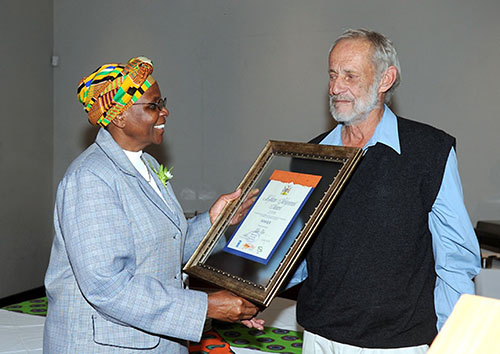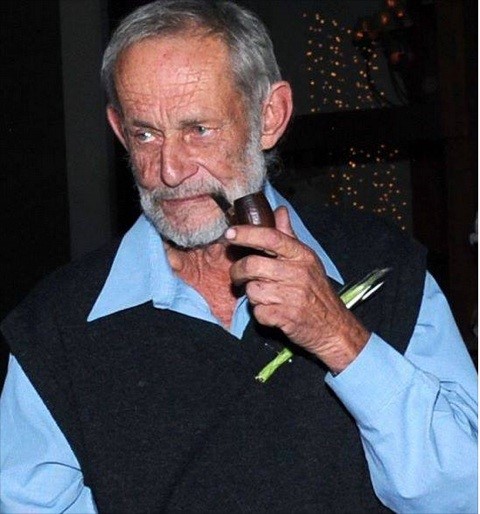Chris Eyre - conservationist
Legendary conservationist of Namibia
Chris Eyre - conservationist
Chris Eyre (1943–2015) - Dedicated Conservationist | Namibia
Retired conservationist Chris Eyre was awarded the Ministry of Environment and Tourism's Lifetime Achievement Award at a function in Windhoek last week. It is the most prestigious award given by the Ministry for dedication to conservation. Eyre joined the Directorate of Nature Conservation in 1971.
He worked at the Von Bach Dam, at Ganab in the Namib-Naukluft Park and at Otjovasandu in the Etosha National Park before being appointed as Principal Nature Conservationist at Khorixas in November 1980.
He worked in the north-west during the time when poaching was rife, a devastating drought led to a crash in wildlife populations and the desert rhino was close to extinction.
With fellow conservationists such as Lucas Mbomporo and long-time friend Garth Owen-Smith, Eyre contained poaching by working closely with traditional leaders and pioneered the community game guard system.
When the Ministry promoted Eyre to Chief Warden at Ondangwa in 1993, he worked on the establishment of the Uukwaluudhi conservancy.
The conservancy was gazetted in 2003 and his work was later recognised by becoming a joint winner of the Namibia Nature Foundation Go Green Environmental Award with King Josia Shikongo Taapopi of Uukwaluudhi in 2004.
Eyre joined the Directorate of Nature Conservation in 1971.He worked at the Von Bach Dam, at Ganab in the Namib-Naukluft Park and at Otjovasandu in the Etosha National Park before being appointed as Principal Nature Conservationist at Khorixas in November 1980.He worked in the north-west during the time when poaching was rife, a devastating drought led to a crash in wildlife populations and the desert rhino was close to extinction.With fellow conservationists such as Lucas Mbomporo and long-time friend Garth Owen-Smith, Eyre contained poaching by working closely with traditional leaders and pioneered the community game guard system.When the Ministry promoted Eyre to Chief Warden at Ondangwa in 1993, he worked on the establishment of the Uukwaluudhi conservancy.The conservancy was gazetted in 2003 and his work was later recognised by becoming a joint winner of the Namibia Nature Foundation Go Green Environmental Award with King Josia Shikongo Taapopi of Uukwaluudhi in 2004.
Courtesy: Absalom Shigwedha from The Namibian
Conservation articles by Chris Eyre
Rhino poaching in Namibia from 1980 to 1990 and the illegal trade in the horn
Halt the hunting of desert wildlife say Namibias experts - 2015
Go back to: Wildlife Guardians & Dedicated Conservationists
Obituary for Chris Eyre
Legendary conservationist Chris Eyre dies (The Namibian 18 June 2015)
THE conservation community is mourning the loss of Chris Eyre, who passed away on Tuesday night at the age of 72, succumbing to cancer. His close friend Koos Verwey spent the last weeks with Eyre at his Opuwo home and said he passed away peacefully in his sleep.
Anthony Eyre was also there to support his brother, and many friends came to visit Chris during his illness.
Eyre is one of the true conservation legends of Namibia, a largely unsung hero who avoided the limelight and devoted his life to the practical protection of the environment. He started his career with what was then the department of nature conservation, working with local communities in Kaokoland to stop poaching during the 1980s, and helped to initiate what is today the internationally recognised Namibian community conservation movement.
After Independence, Eyre worked for the Ministry of Environment and Tourism until his retirement, and then continued to provide a range of technical support, especially to community conservation initiatives.
His work contributed directly to many of Namibia's conservation successes. He always enjoyed the deepest respect of the rural communities he worked with, as well as the broader conservation fraternity.
Eyre will be laid to rest at Otjinungwa in the Marienfluss Valley in the northern Kunene region, where he felt most at home.
Namibia: Tribute to Matui - the Legendary Chris Eyre by Linda Baker
I HEARD that Chris Eyre had seen his last sunset, and knew the end had come.
When I was a young ranger in the late 1980s, I had heard tales of this extraordinary man. Of how he had drawers full of unclaimed S and T (subsistence and travel allowance) cheques. Of how guests were treated to tea – water boiled in an unwashed sausage pan, with a lump of jam added when the sugar ran out.
But mostly, I heard stories about the terrible rhino and elephant poaching, and how Chris and a handful of people were fighting the scourge. Not with bullets, but by sitting down with the farmers, communities and leaders who belonged on the land, listening and talking. This was unheard of at the time, and a disapproving department of nature conservation head office banished him to far-off Keetmanshoop.
I heard too, that he said: “The day they allow women in the ministry (of environment and tourism) is the day we should close it down. That will be the end.”
Fires, tea and dogs
I don't remember when I first met him. But over the years, I came to look past Chris's outwardly rugged appearance; his sometimes abrupt manner. I found that inside was a great man, where honour, integrity, respect and a deep love for nature lived. A man who learnt life's lessons through listening, watching and understanding. Through gazing into a fire, deep in thought, armed with a cup of tea, his pipe and his dogs. He didn't need more.
And I found a deep love for this man and all he stood for. A love I am sure those who met him share, one that observes his purity of intentions and spirit.
One day, he rang me from Ondangwa. “Linda”, he said. He always spoke loudly, and often twice. “Linda, I have to tell you. I have six posts for information officers. And you know, I am going to put women in all of them.” And he did.
Many years later, I reminded him of his early statements about the impending doom of allowing women in the MET. He smoked his pipe thoughtfully, then grinned his toothy grin and chuckled. “I did say that. Yes, I did say that.”
I don't know what changed his mind. But, I think that, in true Chris style, he looked for what was needed, and cast aside any preconceived ideas he may have formed.
The Last Sunsets
I hope, in his final days, while watching his last sunsets, his heart rested easily. Knowing that he had left behind a great legacy, one in which people talk through their differences, united through a common love of the land, its creatures and its future.
I hope he remembered the solid foundations he laid through those long meetings, of how he bridged the rift between farmers and the officials through trust and respect.
I hope he reflected on the many people he had met and the lives he touched. How he nurtured young conservationists who are today among our great leaders.
How he planted within all of us who met him the seed of hope, respect for each other and caring.
And I hope, as he watched his final sunset, he knew that we will not forget him or his sacrifices. But that in each of us, his legacy will endure.
Life's true riches
If I have learnt a lesson from Chris, it is this:
Reward is not in riches, possessions and status. It is in the quiet satisfaction that our lives are in harmony – with nature, with others and with ourselves. Chris was one of those rare people who lived this.
He was, perhaps, the richest of us all.
I salute you, Matui*. Go well on your journey. Goodbye.
* Matui is the affectionate name given to him by the ovaHimba. It refers to his large ears.

